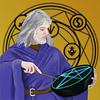Take a photo of a barcode or cover
adventurous
mysterious
Usually, when a book can't seem to decide what it's about, the result is a terrible book.
In the case of Shibumi, Trevanian has managed to weave several very different, seemingly incompatible stories into a cohesive whole. Along the way, he manages to raise expectations that things will be a certain way, only to subvert them.
The book's opening is reminiscent of pulp spy thriller series like The Destroyer. Complete with a larger than life hypercompetent POV character, shadowy government agencies, and global conspiracy.
This soon digresses into a wartime biography of a boy whose birth renders him without a country. He's the son of a Russian aristocrat and (probably) a minor German noble, born in Shanghai where his mother fled after the Bolshevik revolution. After the city falls to the Japanese, he becomes friends with the commander of the occupying force who has commandeered his mother's home as his base of operations. By the time the war ends, his mother has died and he is living in Japan, studying go.
This back-and-forth between the (now obviously satirical) high testosterone, white supremacist spy fantasy and the slower paced, aesthetic journey of Niko to manhood transforms several more times, and incorporates more themes and subjects as it develops. By the end, we have explored caving, Basque separatists, esoteric sex techniques, and more.
Trevanian does a pretty good job of keeping things interesting despite this pastiche. He spends enough time with each subject that it doesn't feel abrupt, but changes often enough to remind you of the other threads.
It's also, in my opinion, a subtle spoof of the spy/action genre in general. This leads to certain choices in characterization which make sense in this context, but which result in an aesthetically flawed product. The antagonists, in particular, tend to be somewhat flat, extremely racist, and comically villainous/corrupt.
Trevanian's own elitism and anti-American sentiment is on display quite prominently, too. Though a salient factor of Niko's personality, the repeated nature of it is definitely a flaw.
It occurs to me that despite its name, Shibumi displays more wabi-sabi than its eponymous aesthetic.
In the case of Shibumi, Trevanian has managed to weave several very different, seemingly incompatible stories into a cohesive whole. Along the way, he manages to raise expectations that things will be a certain way, only to subvert them.
The book's opening is reminiscent of pulp spy thriller series like The Destroyer. Complete with a larger than life hypercompetent POV character, shadowy government agencies, and global conspiracy.
This soon digresses into a wartime biography of a boy whose birth renders him without a country. He's the son of a Russian aristocrat and (probably) a minor German noble, born in Shanghai where his mother fled after the Bolshevik revolution. After the city falls to the Japanese, he becomes friends with the commander of the occupying force who has commandeered his mother's home as his base of operations. By the time the war ends, his mother has died and he is living in Japan, studying go.
This back-and-forth between the (now obviously satirical) high testosterone, white supremacist spy fantasy and the slower paced, aesthetic journey of Niko to manhood transforms several more times, and incorporates more themes and subjects as it develops. By the end, we have explored caving, Basque separatists, esoteric sex techniques, and more.
Trevanian does a pretty good job of keeping things interesting despite this pastiche. He spends enough time with each subject that it doesn't feel abrupt, but changes often enough to remind you of the other threads.
It's also, in my opinion, a subtle spoof of the spy/action genre in general. This leads to certain choices in characterization which make sense in this context, but which result in an aesthetically flawed product. The antagonists, in particular, tend to be somewhat flat, extremely racist, and comically villainous/corrupt.
Trevanian's own elitism and anti-American sentiment is on display quite prominently, too. Though a salient factor of Niko's personality, the repeated nature of it is definitely a flaw.
It occurs to me that despite its name, Shibumi displays more wabi-sabi than its eponymous aesthetic.
adventurous
funny
mysterious
tense
medium-paced
adventurous
dark
funny
tense
fast-paced
Plot or Character Driven:
A mix
Strong character development:
No
Loveable characters:
Complicated
Diverse cast of characters:
Yes
Flaws of characters a main focus:
Yes
Downgrading my old rating by one star. I remember this being a very fun, adventurous and rather macho story but I hadn’t remembered the frequency of the author’s sweeping racial generalities. I think they struck me as humorous when I read this book years ago. Now those generalities just seem like lazy writing.
challenging
slow-paced
adventurous
mysterious
medium-paced
Plot or Character Driven:
Character
Strong character development:
Complicated
Loveable characters:
No
Diverse cast of characters:
Complicated
Flaws of characters a main focus:
Yes
adventurous
dark
mysterious
tense
fast-paced
Plot or Character Driven:
Plot
Strong character development:
No
Loveable characters:
No
Diverse cast of characters:
No
Flaws of characters a main focus:
No
Sounds like a silly name for a spy novel, but it's a great read.
Hiç sevmediğim kitaplar arasında kolayca yerini aldı ve ilginç bir şekilde neden bu kadar çok övüldüğünü, göklere çıkarıldığını çözemedim. Karakterlerin tamamı hatta nicholai bile yüzeyseldi. Hikaye kısmı daha bir garip çünkü arka kapak ve kitabın ilk 30 sayfası bütün kitabı özetlemiş. Son 100 sayfaya kadar sadece baştaki ilk 30 sayfanın açılmış ve uzatılmış halini okuyoruz. Nicholai'nin anlamsız derecede uzun anlatılmış hayat hikayesi tam bitti derken bu sefer de mağara kısımları başlıyor. Ee hani CIA meselesi derken konu bir türlü oraya gelemiyor. En sonunda son 100 sayfada hızlı hızlı olaylar gerçekleşiyor ama hiç tatmin edici bir şekilde olmuyor.
Açıkçası sevemedim ve okurken içim daraldı.
Açıkçası sevemedim ve okurken içim daraldı.



